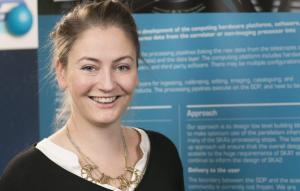Research Areas: Radio-Astronomy, Artificial Intelligence
"There are very few projects in science generally, not just in astrophysics, that have data sizes like the SKA [(Square Kilometre Array)]."
Source: Skatelescope

Early Life
Anna grew up in Cheshire, UK. She has an undergraduate masters’ degree in Physics from the University of Bristol. Anna studied for a PhD in astrophysics at the University of Cambridge. There, she got hooked on astronomy. This was the first time she had the chance to work with a radio telescope.
Career Highlights
Anna is Professor of Radio Astronomy at the University of Manchester’s Jodrell Bank Centre for Astrophysics. Anna researches using machine learning to help astronomers get information from massive amounts of data. Machine learning is a part of artificial intelligence. It means making machines learn from experience and alter their programmes to create more accurate results. Anna is part of a huge team working on the Square Kilometre Array (SKA) radio-telescope.
Part of Anna’s job is to lead the computing design for the European SKA Regional Centre. She works out what’s the best way to get scientific knowledge out of the data collected. A lot of the processes involved need machine learning because SKA will detect tens of millions of objects in space. This means that even simple tasks like identifying and classifying objects will need machine learning solutions.
Anna has established a UK - South Africa programme that develops big data science in South Africa. She also runs training programmes supporting students from southern Africa and Latin America to study graduate degrees in the UK.
Legacy
Anna was awarded the Alan Turing Institute Artificial Intelligence Fellowship in 2019. She received the Royal Astronomical Society Jackson-Gwilt Medal the same year. In 2014, she was named one of the World Economic Forum Top 30 scientists under 40.
Other Interests
Anna wanted to be an archaeologist when she was a child.
